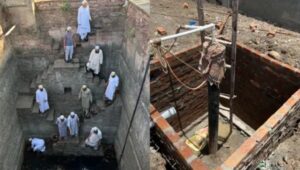Addressing Water Scarcity in Maharashtra: The Dawoodi Bohra Community’s Initiatives
In Yavatmal, a notable transformation in agricultural prospects has become a beacon of hope for farmers, with significant increases in crop yields following years of severe drought.
Ravindra Rathod, a 29-year-old farmer from Kapra village, reflects on the challenges posed by water scarcity, exacerbated by overflowing dams and the seasonal ebb and flow of river water. As a response to this global issue, the Dawoodi Bohra community has taken proactive steps at the grassroots level to combat water scarcity.
Their efforts include rainwater harvesting, water canal restoration, the construction of check dams, and recharge shafts. These initiatives have not only aided Rathod but also over 100 other farmers in the village, enabling them to cultivate crops year-round and altering land use patterns.
The region’s farmers typically grow cotton, soybeans, wheat, and peanuts, depending on the season. The need for localized solutions to water scarcity is becoming increasingly evident. The Dawoodi Bohra community’s Project Rise and the Burhani Foundation’s global water conservation initiative have implemented rainwater harvesting techniques across rural Maharashtra and other parts of India.
Water scarcity poses a significant threat to farmers and the global food supply chain, necessitating water-efficient farming practices, financial support, and sustainable water management strategies.
Mohammed Hasanji, who installed a rooftop rainwater harvesting system near Amravati, highlights the rise in the water table, promising long-term benefits.
Local, national, and international governments play crucial roles in assisting and implementing policies to mitigate the impact of water scarcity on farmers. The Dawoodi Bohra community is working to empower rural residents to confront this challenge by mobilizing a team of over 200 community officials to assess water supply strain and promote resilient water management systems.
The first phase of the water conservation program focuses on rainwater harvesting in backyards, wells, ponds, and local catchment areas. Awareness programs have also been conducted to educate the community on these methods and their role in revitalizing groundwater levels.
Local stakeholders in water management and municipalities have been involved in surveys to understand the local conditions.
Watershed programs have reduced soil erosion in Yavatmal-based villages, with significant increases in agricultural land area reported in Chinchghat and Wadner villages. This expansion provides more agricultural opportunities and aims to reduce seasonal migration for work.
In the past three months, over 16 rainwater harvesting systems have been installed in households and community properties across Maharashtra, spanning several cities, towns, and villages. For the program’s long-term success, the Burhani Foundation is identifying project coordinators in various regions.
Community members have witnessed the benefits of rainwater harvesting, ensuring a consistent water supply for their families and neighbors.
Overall, the Dawoodi Bohra community’s initiatives offer a ray of hope in addressing water scarcity in Maharashtra and serve as a model for grassroots solutions to this pressing issue.

Follow us on Youtube
Follow us on Facebook
Follow us on Twitter
Follow us on Instagram

